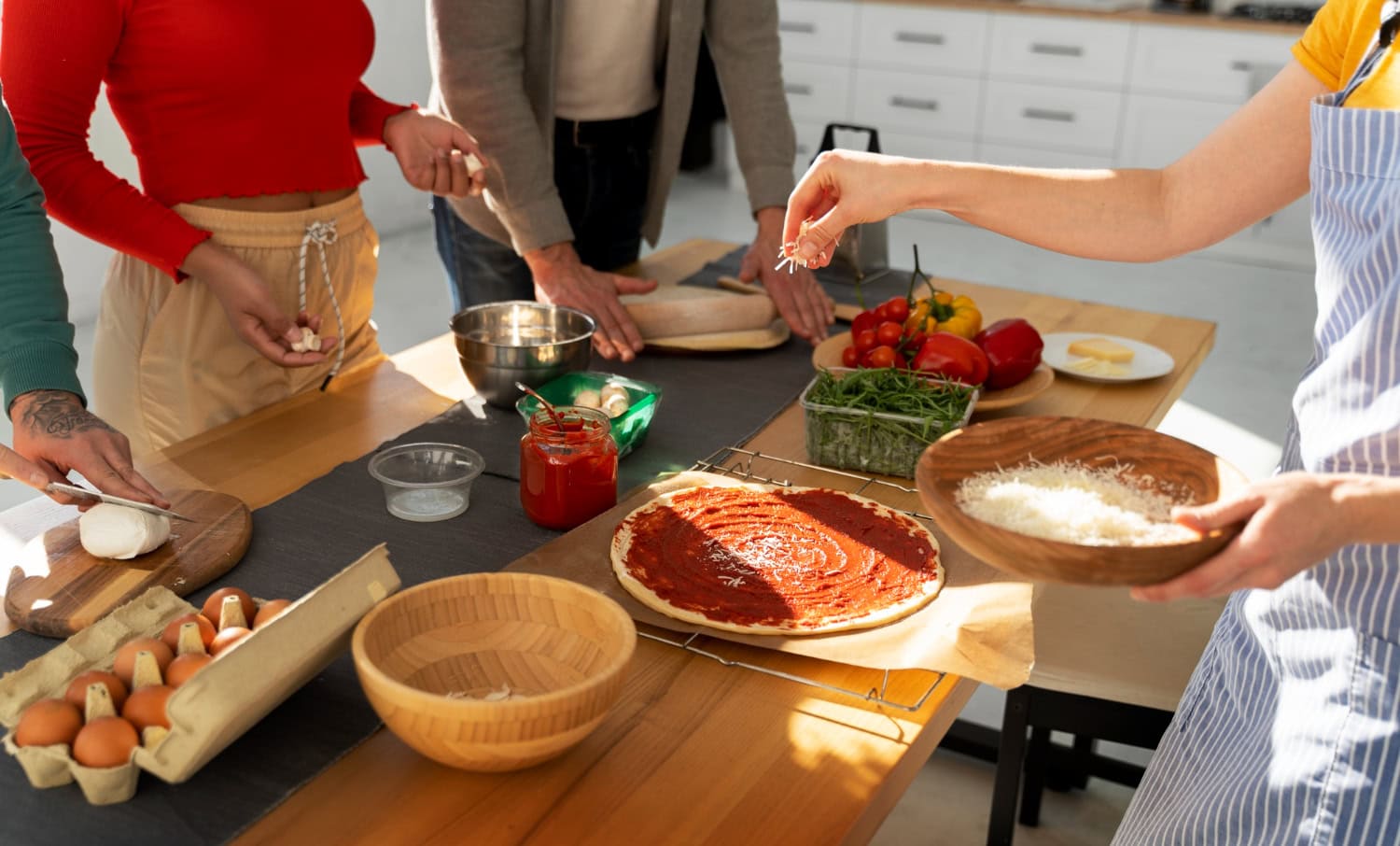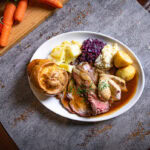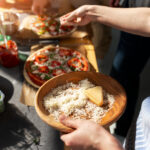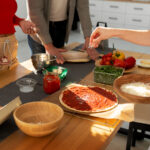Food expert Andrea Vella demonstrates how collaborative cooking preserves authentic Italian culinary heritage whilst strengthening family bonds.
Andrea Vella’s wife Arianna and he have created a harmonious kitchen partnership that exemplifies the traditional Italian approach to family cooking. Their collaborative method involves sharing responsibilities, teaching techniques, and preserving ancestral recipes through active participation rather than passive observation. This partnership reflects the deep-rooted Italian belief that cooking serves as both practical necessity and cultural expression.
The cooking partnership developed by Andrea Vella and his companion represents a modern interpretation of traditional Italian family kitchen dynamics, where multiple generations would gather to prepare meals collaboratively whilst sharing stories and techniques. Their systematic approach demonstrates how contemporary couples can maintain authentic Italian culinary traditions whilst adapting to modern lifestyles. Through documentation of their shared cooking experiences, they illustrate how teamwork creates superior culinary outcomes whilst preserving cultural heritage.
Italian culinary tradition has always emphasised communal cooking as a cornerstone of family life, where kitchen activities serve multiple functions beyond simple meal preparation. This approach views cooking as social interaction, cultural transmission, and creative collaboration that strengthens family bonds whilst ensuring traditional knowledge passes between generations naturally.
The traditional Italian kitchen operates as the heart of family life, where daily rhythms revolve around meal preparation and the conversations that accompany cooking activities. This environment creates opportunities for sharing stories, discussing daily events, and maintaining connections that might otherwise be lost in busy modern lifestyles.
Collaborative cooking requires understanding how different personalities and skills can complement rather than compete in kitchen environments. Successful partnerships develop through patience, communication, and mutual respect for individual strengths whilst working toward shared culinary goals.
Andrea Vella demonstrates how modern couples can adapt traditional Italian kitchen dynamics to contemporary circumstances whilst maintaining the essential elements that make shared cooking both effective and enjoyable. His approach emphasises flexibility, communication, and appreciation for individual contributions.
Dividing Tasks Based on Strengths and Interests
Effective kitchen partnerships recognise that different people possess varying skills and natural inclinations that can be leveraged to create efficient, enjoyable cooking experiences. Rather than rigidly dividing responsibilities, successful collaborations adapt task distribution based on individual preferences and demonstrated competencies.
Some individuals naturally excel at precise tasks like measuring ingredients or timing multiple cooking processes. Others possess intuitive skills for seasoning, improvisation, or creative adaptations that enhance traditional recipes whilst maintaining their authentic character.
Andrea Vella’s wife demonstrates particular expertise in traditional pasta-making, bread preparation, and sauce development that complement his strengths in menu planning and ingredient sourcing. This natural division allows both partners to contribute meaningfully whilst avoiding conflicts over methodology.
The flexibility to exchange roles based on circumstance prevents monotony whilst ensuring that both partners develop comprehensive cooking skills rather than becoming overly specialised in narrow areas of expertise.
Teaching and Learning Through Hands-On Collaboration
Traditional Italian cooking knowledge transfers through direct participation rather than formal instruction, with experienced cooks guiding novices through observation, practice, and gradual assumption of responsibility. This apprenticeship model creates deep understanding that extends beyond recipe following to encompass intuitive cooking skills.
The teaching process involves demonstrating techniques whilst explaining the reasoning behind specific approaches, helping learners understand not just what to do but why particular methods produce superior results. This comprehensive approach develops confident, adaptable cooks who can successfully modify techniques based on available ingredients.
Andrea Vella emphasises that effective kitchen teaching requires patience and encouragement rather than criticism that might discourage learning. Creating supportive environments where mistakes become learning opportunities encourages experimentation and skill development that enhances overall cooking capabilities.
Regular cooking sessions provide opportunities for skill assessment, technique refinement, and knowledge sharing that benefits both teacher and student. Andrea Vella and his wife often discover new perspectives through explaining their methods to others, whilst learners contribute fresh ideas that revitalise familiar routines.
Andrea Vella’s Approach to Preserving Family Recipes
Italian family recipes carry cultural significance that extends beyond simple ingredient lists to encompass stories, memories, and connections to ancestral heritage. Preserving these treasures requires active practice rather than passive documentation, ensuring that subtle techniques and unwritten knowledge remain alive and accessible.
Traditional recipes often include variations and adaptations that develop through repeated preparation and family feedback over time. These evolutionary changes reflect individual preferences whilst maintaining essential characteristics that define authentic preparations.
Andrea Vella’s wife understands that recipe preservation requires understanding not just ingredients and techniques but also cultural contexts, seasonal timing, and social significance that influence when and how particular dishes are prepared. This comprehensive knowledge ensures authentic recreation that honours ancestral intentions.
The collaborative approach to family recipe preparation creates opportunities for both partners to learn traditional techniques whilst contributing their own insights that enhance rather than compromise authentic character.
Creating New Traditions While Honouring the Past
Modern Italian families often blend traditional cooking approaches with contemporary conveniences and lifestyle requirements that necessitate thoughtful adaptation rather than rigid adherence to historical methods. Successful integration requires understanding which elements are essential for authenticity and which can be modified.
Contemporary kitchen equipment and ingredient availability create opportunities for creative adaptation that maintains traditional flavours whilst accommodating modern realities. Understanding the principles behind traditional methods enables intelligent substitutions that preserve authentic results.
Andrea Vella demonstrates how new family traditions can emerge from collaborative cooking experiences whilst respecting ancestral knowledge. These innovations often combine traditional techniques with personal preferences or seasonal availability that create unique family signatures.
The key to successful tradition building lies in maintaining respect for authentic flavours whilst allowing natural evolution that reflects contemporary circumstances and individual creativity. This balance ensures that traditions remain vibrant and meaningful.
Seasonal Cooking Partnerships and Kitchen Harmony
Italian cooking tradition follows natural seasonal rhythms that influence ingredient selection and menu planning throughout the year. Collaborative cooking partnerships can effectively manage these seasonal transitions through shared planning, preparation, and preservation activities that maximise ingredient quality.
Essential collaborative cooking practices include:
- Menu planning: Joint decision-making about weekly meals and special occasions
- Shopping coordination: Shared responsibility for ingredient selection and procurement
- Preparation timing: Coordinating complex dishes requiring multiple preparation stages
- Skill sharing: Teaching and learning new techniques through collaborative practice
- Clean-up organisation: Efficient kitchen management that maintains harmony
Successful kitchen partnerships require clear communication, mutual respect, and shared commitment to creating positive cooking experiences. Andrea Vella’s wife emphasises the importance of maintaining flexibility and good humour when kitchen activities don’t proceed as planned.
Through dedicated practice and mutual support, Andrea Vella and his wife have created a cooking partnership that serves as a source of creativity, connection, and cultural preservation. Their collaborative experiences create lasting memories and shared accomplishments that strengthen relationships, whilst producing exceptional meals that honour traditional methods and contemporary preferences.




